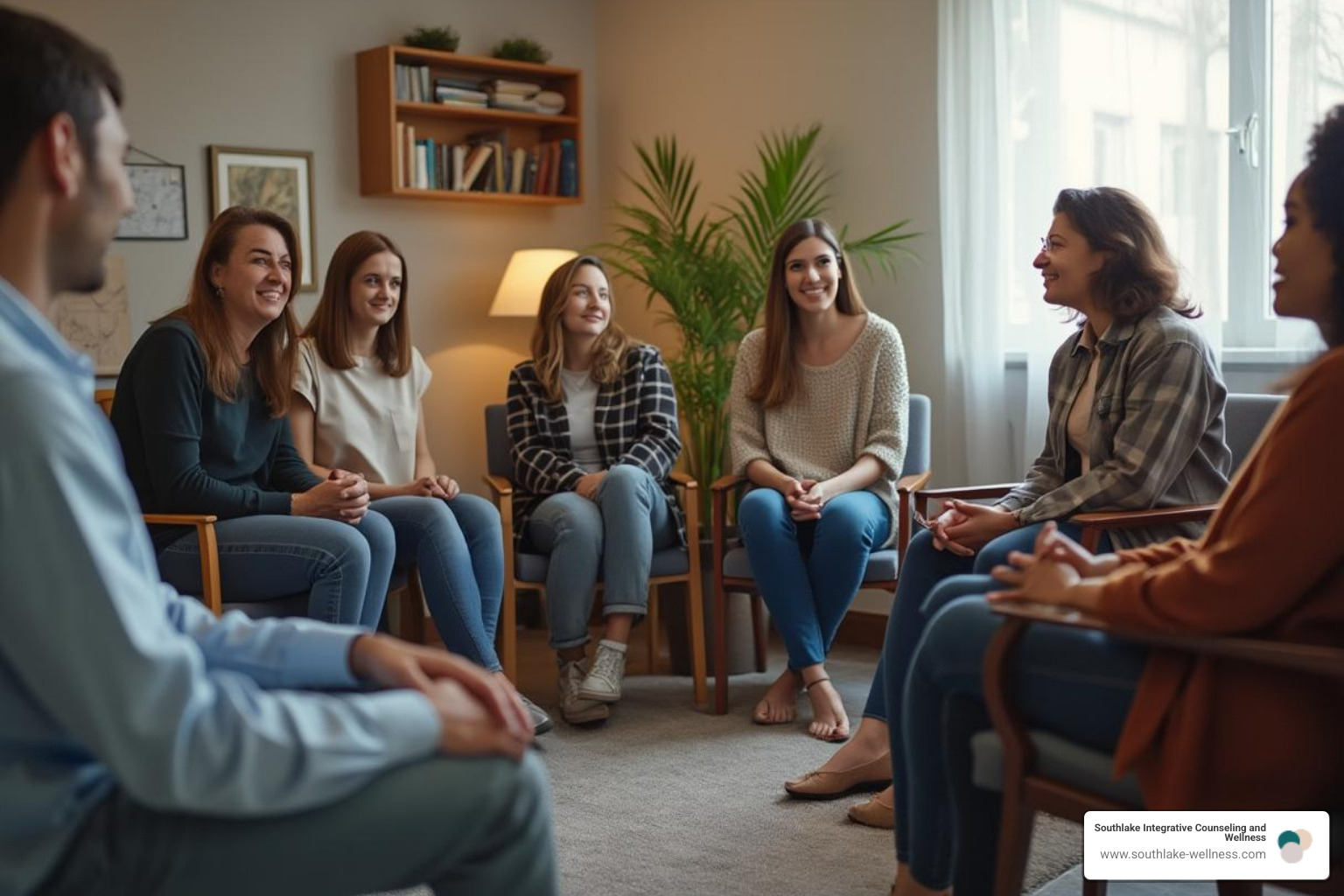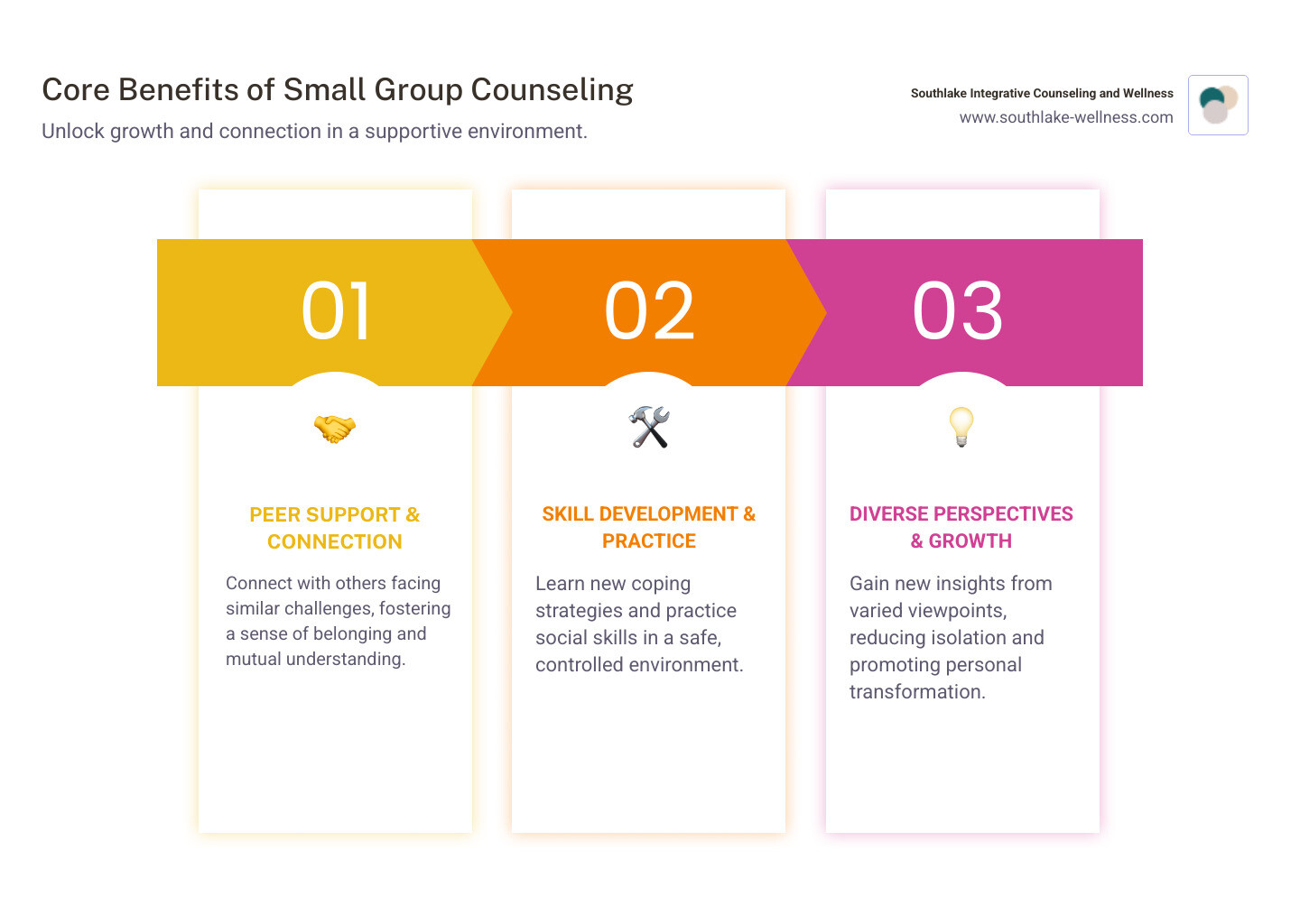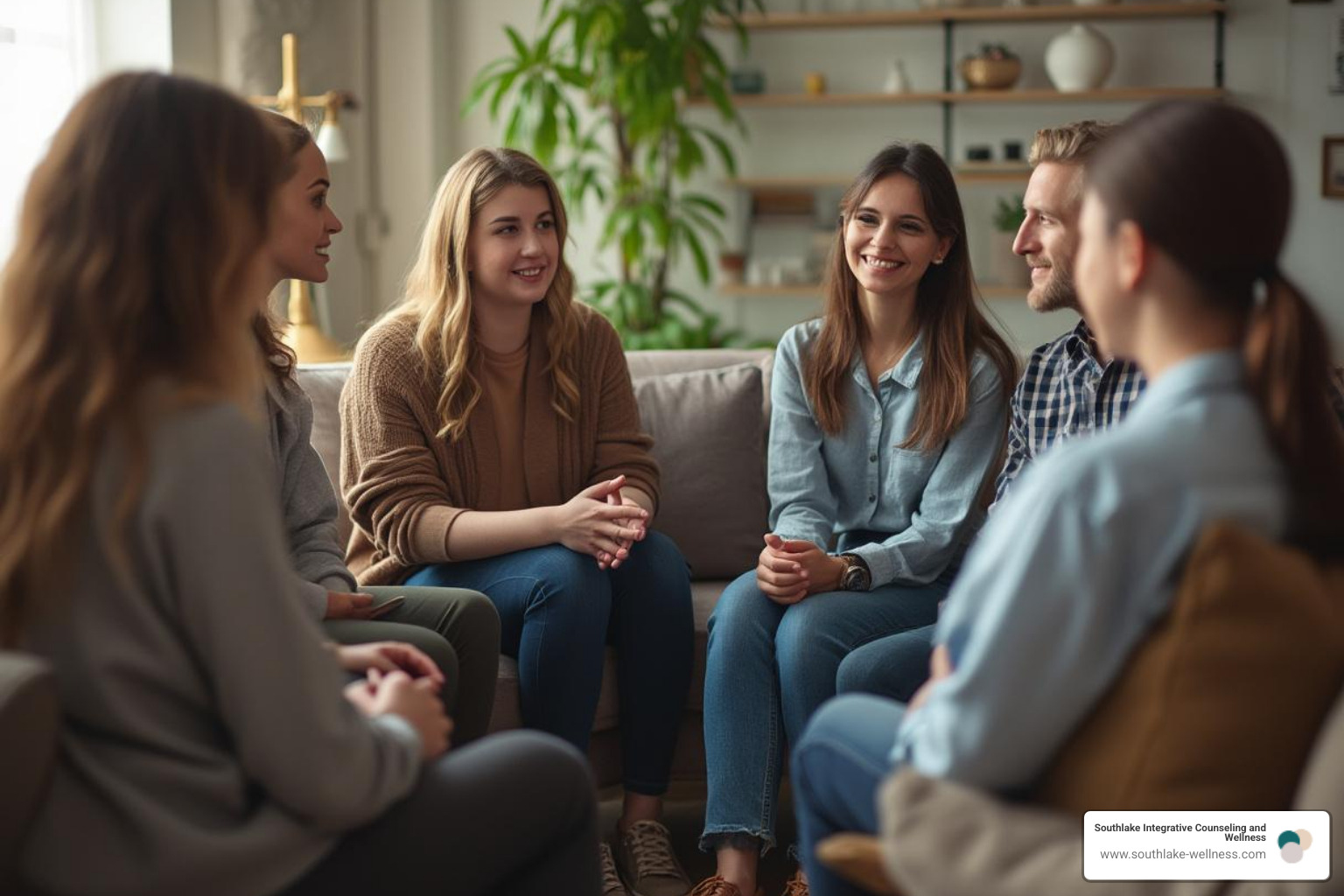
What to Expect in Small Group Counseling Sessions
Small group counseling sessions bring together a handful of people, guided by a trained counselor, to explore shared challenges and foster personal growth. This structured setting offers unique benefits, providing both support and practical tools.
What is Small Group Counseling?
- A form of therapy where a counselor works with several individuals simultaneously.
- Typically involves 3-12 participants.
- Sessions usually last 60-90 minutes and meet weekly.
- Often short-term, starting with a minimum of six sessions.
- Focuses on shared concerns, skill development, and mutual support.
Navigating life's challenges alone can be isolating. Small group counseling offers a powerful way to connect with others who understand, learn new coping mechanisms, and build essential skills in a safe, dynamic environment where you can gain perspective and confidence.
As a clinician with over a decade of experience, I've seen how small group counseling sessions help individuals break unhealthy patterns and improve their confidence. My work focuses on customizing therapeutic approaches like CBT and DBT to foster internal change that leads to external growth.

Small group counseling sessions terms to know:
- facilitating a group counselling session
- group counseling session outline
- evidence-based group therapy
What is Small Group Counseling and Why is it a Powerful Tool?
Small group counseling sessions are dynamic therapy gatherings where a professional counselor guides a few individuals in exploring common concerns. While vital in schools, their benefits reach people of all ages.
A key advantage is efficiency—one session benefits multiple individuals, allowing us to help more people effectively. But beyond that, these sessions foster powerful peer learning and support. You gain wisdom from others on similar paths, encouraging open sharing that builds self-awareness. It's also a fantastic place to practice new behaviors and boost social skills like communication and teamwork.
Group therapy expert Irvin D. Yalom identified key therapeutic factors, including universality and altruism. Universality is the powerful realization that you're not alone in your struggles, which reduces isolation. Altruism—the act of helping others in the group—can boost your self-esteem and sense of purpose. To learn more, visit our page on the Advantage of Group Counselling Sessions.

The Core Principles
Our small group counseling sessions are built on powerful principles. Group members become a strong support network, creating a sense of camaraderie. You'll also benefit from role modeling as you watch others steer challenges. This makes the group a safe space to practice new behaviors without fear of judgment. Another benefit is gaining diverse perspectives, as each person offers unique viewpoints. Group counseling is also often a more affordable way to access quality mental healthcare. We are committed to using scientifically-backed approaches. You can learn more on our page about Evidence-Based Group Therapy.
Who Can Benefit?
Small group counseling sessions can help many different people.
- For students, groups can boost academic progress, aid career exploration, and nurture social-emotional development. This leads to better study skills, improved school adjustment, and stronger friendships.
- For adults, groups are excellent for tackling shared challenges like grief, anxiety, depression, or addiction recovery. Connecting with others who understand creates a powerful bond.
We offer groups focused on specific topics, including:
- Grief and Loss: Navigating the emotions of losing someone.
- Anxiety and Depression: Learning coping strategies and managing symptoms.
- Life Transitions: Adjusting to major changes like divorce or a new career.
- Social Skills Development: Practicing communication and assertiveness.
- Addiction Recovery: Building a support network for sobriety.
- Growth Mindset: Fostering resilience and a positive outlook.
- Friendship Skills: Learning to build and maintain healthy friendships.
- Emotional Regulation: Developing tools to handle strong feelings.
The Key Benefits of Small Group Counseling Sessions
Participating in small group counseling sessions offers a multitude of benefits for holistic growth and empowerment.

A significant advantage is the boost to your social-emotional growth. Connecting with others who understand helps reduce feelings of social isolation, replacing them with positive peer relations and a sense of belonging. This supportive environment fosters personal development, improves communication skills, and provides crucial emotional support. Many individuals gain increased self-esteem as they realize their experiences are valid.
For students, these groups are impactful for academic and career development. Small group counseling sessions can help improve study skills, address underachievement, and promote better school adjustment, helping young people become more well-rounded and confident.
Developing a Growth Mindset
In our sessions, we explore the growth mindset, a concept popularized by Dr. Carol Dweck. Unlike a 'fixed mindset' (believing abilities are set in stone), a growth mindset is the understanding that skills can grow and develop through dedication and hard work. This idea is rooted in neuroplasticity—the brain's ability to change and form new connections throughout life. We teach practical ways to build perseverance, such as asking for help and using positive self-talk. You'll learn to accept challenges and see mistakes as learning opportunities. To dig deeper, you can explore the Scientific research on the growth mindset.
Enhancing Coping Skills and Resilience
Life is full of unexpected turns. Our sessions equip you with practical tools for enhancing coping skills and building resilience. We focus on emotional regulation, teaching you to manage feelings so they don't become overwhelming. This includes developing distress tolerance skills to steer difficult situations without resorting to unhelpful behaviors. We also emphasize problem-solving strategies to approach challenges with a clear plan. The group provides a safe space to practice these skills with feedback from the counselor and peers. Building resilience is about strengthening your ability to bounce back from adversity, a vital skill we help you develop. To see how mindfulness can aid this journey, visit our page on Mindfulness-Based Group Therapy.
The Anatomy of an Effective Group Session
An effective small group counseling session is a carefully crafted experience. Our role as counselors involves meticulous planning to ensure each session builds upon the last within a consistent, predictable routine. This structure helps participants feel safe and focused. Building rapport is paramount, as it lays the foundation for open sharing and trust.

The Facilitator's Role in Guiding the Group
As facilitators, our role is crucial. We create and maintain a safe space by modeling respect and fostering acceptance. We guide discussions to keep them productive, manage group dynamics with empathy, and teach skills relevant to the group's goals, such as conflict resolution or emotional regulation. Our focus in these short-term groups is on addressing specific barriers and teaching coping mechanisms, not providing long-term therapy for psychological disorders. We empower you with tools for immediate growth and make referrals for more intensive support when needed. For more insights, see our guide on Facilitating a Group Counselling Session.
Planning and Structuring Effective small group counseling sessions
Effective groups are the result of careful planning:
- Group Sizing: Small groups work best. While some accommodate up to 12, we find 5 or 6 participants is ideal for connection and attention. For younger children, groups may be as small as 3 or 4.
- Scheduling: Consistency is key. Sessions are typically held once a week for 60 to 90 minutes.
- Duration: Most groups are short-term and goal-focused, running for 6 to 12 weeks. A minimum of six sessions is recommended.
- Needs Assessments: We often use needs assessments, such as surveys or referrals, to understand participant challenges and tailor group content accordingly.
- Parental Consent (for minors): Obtaining informed parental consent is a crucial step for our younger participants.
We carefully outline each session for a smooth flow. You can explore a typical structure in our Group Counseling Session Outline.
Building Rapport and a Safe, Predictable Space
Creating a safe and trusting environment is foundational. We establish clear confidentiality rules from the start, explaining that what is shared in the group stays in the group (with exceptions for safety risks). We also involve members in setting group norms, such as active listening and respecting differences, to foster a sense of ownership.
Icebreakers and trust-building activities help ease initial awkwardness and deepen bonds over time. Here are some examples of Get-to-Know-You Questions we might use:
- What's one thing you're passionate about?
- If you could have any superpower, what would it be and why?
- What's a small victory you celebrated recently?
- What's one skill you'd love to learn?
- If you could travel anywhere in the world, where would you go first?
- What's your favorite way to relax or de-stress?
- What's a book, movie, or song that has had a big impact on you?
- What's something you're looking forward to this week?
For a comprehensive list, you can download our Get-to-Know-You Questions.
Common Activities and Targeted Goals
In a small group counseling session, you are empowered to set your own goals and actively work towards them. It's not just about talking; it's about doing. We use interactive exercises, role-playing, and group discussions to help you practice new skills and gain confidence. To see how we guide these sessions, view our guide on How to Conduct a Group Counseling Session.
Activities and Techniques Used in small group counseling sessions
To keep sessions vibrant and effective, we use a variety of techniques:
- Feelings and structured check-ins help everyone share how they're feeling and ensure every voice is heard.
- Role-playing scenarios provide a safe space to practice new skills, like setting boundaries or navigating difficult conversations, without real-world pressure.
- Games, especially for younger groups, make learning social skills enjoyable and memorable.
- Journaling offers a personal way to process thoughts and feelings that might be tough to say out loud.
- Mindful breathing exercises help calm emotions, reduce stress, and improve focus.
- Creative arts can be a wonderful way to process tough emotions or explore complex topics non-verbally.
Addressing Specific Needs and Goals
The beauty of small group counseling sessions is how they can be custom to your unique goals. We customize activities to match the specific challenges of each group.
For those building connections, we focus on friendship skills, exploring what it means to be a good friend and practicing healthy communication. If you're struggling with big feelings, our groups on emotional regulation help you understand your emotions, identify triggers, and build a toolbox of healthy coping strategies. For anger management, we focus on self-control, practicing strategies like taking a break and using "I-messages."
Building on the growth mindset, we teach concrete ways to develop perseverance, reframing challenges as opportunities. A key part of our work is helping you create a personal "toolbox" of coping strategies for handling stress. We always encourage participants to work with students to set goals that are personal and meaningful, making you an active partner in your growth.
Measuring Success and Concluding the Journey
For us at Southlake Integrative Counseling and Wellness, the effectiveness of small group counseling sessions isn't just a feeling; it's something we truly believe in and can show. We're dedicated to tracking our groups' success and impact. This commitment helps us make sure our work genuinely helps people grow. From the very first meeting to the last, we keep an eye on progress, celebrating every step forward. When the journey comes to an end, we make sure it's a thoughtful and empowering process, helping everyone take their new skills into their daily lives.
It's a wonderful thing to see people develop personally, grow academically and in their careers, and bloom socially and emotionally. We often see a big boost in self-esteem, better ways of talking with others, less feeling alone, and a strong sense of belonging. It’s why we do what we do! To learn more about how we wrap up a group session, you can read about Closing a Grougroup counseling session outlinep Counseling Session on our website.
How is Progress Measured?
We use different ways to measure how much our small group counseling sessions help. This allows us to see the real impact of our work:
First, we use pre- and post-group assessments. This means we ask questions or have people fill out surveys before the group starts and again after it finishes. For example, we might ask, "On a scale of 1 to 5, how confident do you feel managing your anger?" Comparing the answers helps us see clear changes in skills or feelings. Sometimes, parents or teachers might also complete surveys to give us a wider view of behavioral changes.
We also gather feedback forms throughout and at the end of the group. These forms are a great way for participants to tell us in their own words what worked, what they found helpful, and where they still want to grow. Their insights are super valuable!
For groups with specific goals, like reducing aggressive outbursts or making more friends, we look for observed behavioral changes. We might use surveys that parents or teachers fill out to see if the skills learned in the group are being used outside of our sessions, in real life. This shows us if the learning is truly sticking.
A big part of our process is helping each person set personal goals at the beginning. Then, throughout the sessions, we regularly check in on their progress. We celebrate those small wins and adjust our approach if needed. Seeing participants reach their own goals is one of the most rewarding parts of our job.
Finally, while it's a bit harder to put a number on, we consistently see an increased confidence in our participants. As they learn new skills and get positive support from others in the group and from us, they stand a little taller. This boost in confidence often shows up in how they talk about themselves and interact with others.
The Final Session and Beyond
The last session of a small group counseling session is a special time. It’s a moment for everyone to look back and see how much they’ve grown. We take time to reflect on growth, review all the learned skills, and truly acknowledge the progress made by each person and the group as a whole. We encourage everyone to share what they found most useful, what new skills they're practicing, and how things feel different for them now.
It’s also a time for saying goodbye, which can feel a little bittersweet. But it’s an important step in the journey. We help participants plan for future challenges, talking about how they can keep using their new skills in daily life. We also discuss ways they can continue to support themselves after the group ends. Sometimes, we even have a small celebration, because every bit of growth is worth cheering for!
The skills and insights you gain in small group counseling sessions are meant to be with you for the long haul. They’ll help you steer life's ups and downs with more strength and a greater sense of connection, embodying the holistic approach to mental healthcare we believe in at Southlake Integrative Counseling and Wellness.
Learn why the final moments of group therapy matter most in our expert blog on closing group counseling sessions with purpose and care.
Conclusion
As we wrap up our journey through small group counseling sessions, it's clear that these gatherings offer something truly special. They're more than just therapy; they're vibrant communities where you can find understanding, support, and a path toward real personal growth. Imagine connecting with others who genuinely "get it," sharing laughter, tears, and breakthroughs in a space that feels safe and truly accepting. This is the heart of what makes group counseling so powerful.
The benefits you can gain are far-reaching. From boosting your social-emotional skills and improving how you communicate, to building unshakeable self-esteem and developing solid coping strategies, these sessions are designed to help you thrive. You'll find the immense power of shared experience, realizing you're not alone in your struggles and that a profound sense of belonging awaits. This collective journey naturally fosters greater connection and resilience, helping you bounce back from life's challenges with newfound strength.
At Southlake Integrative Counseling and Wellness, we believe in a holistic approach to your well-being. This means we don't just focus on your mind; we understand the incredible link between your thoughts, feelings, and physical self – your mind-body connection. Our approach to small group counseling sessions integrates evidence-based therapies with compassionate, alternative modalities, all designed to help you find emotional balance and build lasting resilience.
If you're ready to experience the transformative power of connecting with others on a shared path of growth, we warmly invite you to take the next step. Let us help you find how our group therapy services can support your journey toward a healthier, more fulfilling life. You can Explore our group therapy services on our website today.